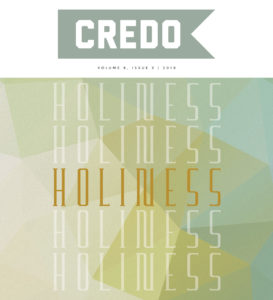When did you first realize you wanted to devote your life to the pastorate?
 I am the last of six children born into a Southern Baptist home. My mother was a godly woman who played a significant role in the spiritual formation of all her children both by her instruction and her example. Despite a difficult marriage and enduring significant hardships throughout her life, she maintained a sincere, humble devotion to Christ that empowered her love for people and faithful service in the church.
I am the last of six children born into a Southern Baptist home. My mother was a godly woman who played a significant role in the spiritual formation of all her children both by her instruction and her example. Despite a difficult marriage and enduring significant hardships throughout her life, she maintained a sincere, humble devotion to Christ that empowered her love for people and faithful service in the church.
In some respects, it is not surprising that two of her three sons would be called to pastoral ministry. But it was a very difficult process for me to come to terms with that call. It first began to land on me when I was sixteen years old, during a special emphasis in my home church. At age twenty-one, I accepted the call to pastor Rock Prairie Baptist Church in College Station, Texas. That was a formal resolution of the struggle for me.
You have a had a long friendship with Tom Nettles, the Baptist historian and theologian. How did you first meet Tom and how has he influenced your life?
I met Tom while I was a junior at Texas A&M. My brother, Bill, was a student at Southwestern Baptist Theological Seminary and had become friends with Tom. I was having a real crisis about being called to gospel ministry, so Bill arranged for me to meet individually with three of his professors for counsel. The first two men did not seem to understand what I was trying to say. I was pretty skeptical that it would be any different with Dr. Nettles. To my surprise, and great benefit, he did and was very helpful in redirecting my thinking on the issue.
When I enrolled in seminary the summer after graduating from Texas A&M, Tom was my first professor. His church history class exposed the superficiality of my theological understanding and forced me to scrutinize my beliefs in the light of Scripture. As my professor, he helped me to understand the authority of Scripture and the grace of God in salvation in ways that have shaped my pastoral ministry for the last forty years. As a friend, his fellowship and counsel have strengthened me in ways that I cannot fully measure.
The doctrines of grace have had a long-lasting effect on your pastoral ministry. How did you first come to embrace the doctrines of grace? In what ways have these doctrines sustained you personally and your church over the years?
God used two of my professors at Southwestern, Tom Nettles, and the late Curtis Vaughan, to challenge my thinking on the grace of God in salvation. I kept finding myself on the wrong side of the various historical debates described in Dr. Nettles’ lectures (Pelagius, Hincmar, Erasmus, General Baptists, etc.). Finally, I went to see him and asked him if I had misunderstood him in class such that my notes were wrong. His response is etched into my memory: “No. Your notes are right. You are wrong.” That day began a year-long re-evaluation of my doctrinal convictions that resulted in affirming the doctrines of grace.
No small part of my investigation included two semesters in Dr. Vaughan’s New Testament Greek class. As we were exegeting Ephesians 1, one of my classmates complained that he knew what verse 4 says but that he wanted to know what it means. Dr. Vaughan responded, “Brother, it means what it says.” I could no longer escape the plain meaning of such stark statements in God’s Word.
The doctrines of grace have undergirded my devotional life, as well as my preaching and teaching throughout my ministry. They have kept me anchored to the goodness and mercy of God revealed in Christ. They reassure me of God’s absolute sovereignty over every aspect of my life and over all history. The substitutionary nature of Christ’s atonement has been riveted to my mind by understanding God’s sovereign purpose in it. I believe teaching these doctrines expositionally and, in their confessional framework, have given the church I serve both stability and a passion to see God’s glory extend to the ends of the earth.
What counsel would you give to a pastor whose staff does not embrace Reformed theology?
Be patient. Focus on doctrinal essentials on which you do agree and never take those essentials for granted. Teach. Then teach some more. Review doctrinal books together. Reassure them that your disagreement does not mean that you judge them ignorant, unspiritual, or unfit for ministry.
If you do not come to a substantive agreement that can be confessionally defined (with whatever confession the church uses), then it may be wise to plan to part ways. If this conclusion is reached, do your best to pursue it with humility, grace, and love.
When did you first start Founders Ministries and what has been its greatest contribution over the decades?
Founders started in 1982 in a prayer meeting among 7 men in a hotel room in Euless, Texas. Our first conference took place in 1983 in Memphis, TN. I don’t know how to measure the contribution Founders has made over the years. We have tried to call attention to the biblical and historical witness to the grace of God in salvation and the impact that should have on local churches. We have encouraged the recovery of the gospel and the biblical reformation of churches. The Lord will evaluate our efforts and on that day, and we will be resting completely in His grace.
Years ago, you put forward a resolution at the Southern Baptist Convention Annual Meeting on church membership. Why is recovering regenerate church membership paramount to the health of the local church and the Southern Baptist Convention?
One of the most significant contributions that Baptists have made to Protestant Christianity has been our emphasis on ecclesiology. At the heart of our understanding of the church is the conviction that a church is to be comprised of people who have been born of God’s Spirit. Because of our commitment to congregationalism, this biblical conviction is of greater practical importance for us than for other types of churches. If a church is comprised of significant numbers of unregenerate people, then the desires and ways of thinking of that congregation will be carnal and not spiritual. They will not submit to the authority of God’s Word or follow its teachings—especially where it blatantly contradicts the current wisdom of the world. Such a church will inevitably fall under the judgment Jesus rendered to churches at Sardis and Laodicea. One of the most significant contributions that Baptists have made to Protestant Christianity has been our emphasis on ecclesiology. Share on X
You’ve pastored Grace Baptist Church since 1986, a church that affirms the Second London Baptist Confession of Faith along with the New Hampshire Confession of 1853. To young pastors just beginning ministry, what value is there to adopting a historic confession as a church congregation?
A commitment to a robust confession serves a church well. It safeguards a congregation from every new, unbiblical fad that arises. It serves as a signal to the community and a reminder to the congregation that in certain, important doctrinal areas, the church is not looking for truth, it is convinced it has found the truth and willingly confesses it. A good confession provides doctrinal accountability to members and leaders. Those who teach and lead have a help and standard by which to measure their own ideas and convictions regarding the Bible and its teachings.
A time-tested confession, such as the two you mention (and that we use), also demonstrates that a church is standing in a historical stream of Christian churches who have tried to be faithful to the Lord in their days, as well. I highly recommend utilizing a confession of faith in your church.
You’ve written and edited a number of books over the years, but perhaps one of your most popular books is Dear Timothy: Letters on Pastoral Ministry. In light of that book, what pastoral challenge do you think most new pastors will face in the first five years and what advice might you give to them?
Dealing with their own hearts. First Timothy 4:16 needs to be tattooed on the back of every pastor’s eyelids. Guard your heart and rigorously apply the gospel to yourself every day. Don’t forget that before you are a shepherd you are a sheep. You need what you commend to others.
If you were able to have a conversation with your 20-year-old self, what would you say?
Don’t be so hard on pastors! Study harder. Marry Donna sooner. Intentionally spend time listening to older Christians. Memorize more Scripture.
If you could seek counsel from one theologian in church history, who would you choose and why?
John Calvin. His life didn’t turn out the way he planned and he developed his theology and fulfilled his calling in service to one local church. I admire his fortitude, perseverance, and productivity and would love to listen to his counsel.


